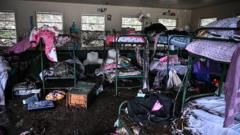The Australian government has proposed a ban on social media access for children under 16, igniting a heated debate over its potential impact on young users. While the legislation aims to protect children from online harms, experts express concerns about its feasibility and the risk of driving minors to unregulated online spaces.
**Australia's Social Media Ban for Kids: A Step Forward or Misguided Attempt?**

**Australia's Social Media Ban for Kids: A Step Forward or Misguided Attempt?**
Australia's government unveils its groundbreaking plan to restrict social media access for children under 16 in a bid to enhance safety online.
The Australian government, spearheaded by Prime Minister Anthony Albanese, has introduced a bold proposal aiming to restrict access to social media platforms like X, TikTok, Facebook, and Instagram for children under 16. This initiative, described as "world-leading," comes after alarming incidents of cyberbullying that have affected youths, like James, a 12-year-old who experienced severe harassment through Snapchat, prompting his mother to support the legislation.
Lauded by many parents for safeguarding children, the proposed ban raises significant questions among experts about its practicality and the implications of pushing kids into less safe parts of the web. The legislation is still in its early stages, with further discussions pending in the Senate, and it emphasizes penalties for tech firms that do not comply. However, messaging services and some sites like YouTube will remain accessible, highlighting complexities in defining what constitutes "social media."
Critics argue that while the initiative seeks to address youth safety, it could inadvertently isolate children from necessary digital interactions, especially among vulnerable groups who find community online. Digital Industry Group Inc dismisses the law as outdated and warns it may exacerbate the very issues it seeks to solve.
As the eSafety Commissioner, Julie Inman Grant, contemplates the logistical challenges of enforcing the ban, concerns persist about the link between social media and mental health, with some claiming research does not firmly establish this connection. Advocates for education over prohibition suggest fostering critical thinking in children to navigate digital spaces safely.
Despite facing opposition from experts and academics labeling the ban as a "blunt instrument," parents like Emma assert it provides a necessary framework for protecting children from the dangers of uncontrolled social media use. The government has acknowledged the fast-paced nature of technology and plans to continually review and adapt its approach.
This debate echoes past international attempts to restrict youth access to online platforms, such as South Korea's failed "shutdown law" and similar efforts in France and Utah. Albanese remains committed to addressing technological challenges while sending a steadfast message to families about the importance of safety in the digital realm.
Ultimately, for families like Emma's and Friedlander's, this proposed crackdown represents hope for recapturing childhood experiences, devoid of digital pressures, enabling children like James to enjoy outdoor activities, free of the lurking dangers of cyberbullying.




















